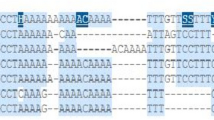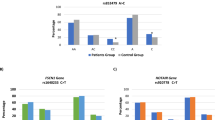Abstract
The purpose of the present study was to evaluate the association between TCF7L2 rs12255372(G/T) or rs7903146(C/T) polymorphism and breast cancer risk, and clinico-pathologic characteristics of the patients. Genotyping of these polymorphisms was performed on 387 breast cancer patients and 252 normal and healthy women who had no history of any malignancy using polymerase chain reaction–restriction fragment length polymorphism (PCR–RFLP) method in a hospital-based Malaysian population. The allele (P = 0.033) frequency of rs7903146 (T) polymorphism was significantly higher in the cancer patients than normal individuals. No significant association was demonstrated between CT (ORadj = 1.386; 95% CI, 0.985–1.949) or TT (ORadj = 1.579; 95% CI, 0.869–2.870) genotype and breast cancer risk. However, women who were carriers of T allele (ORadj = 1.316; 95% CI, 1.022–1.695) or T allele genotype (ORadj = 1.419; 95% CI, 1.027–1.960) showed significant increased risk of breast cancer. Women who were GT heterozygotes (ORadj = 1.329; 95% CI, 0.948–1.862) or TT homozygotes (ORadj = 1.574; 95% CI, 0.829–2.987), and carriers of T allele genotype (ORadj = 1.365; 95% CI, 0.989–1.883) or T allele (ORadj = 1.284; 95% CI, 0.995–1.657) were not associated with breast cancer risk. The rs7903146(T) allele genotype was significantly associated with nodal involvement (P = 0.003) but rs12255372 (T) allele genotype was not associated with the clinico-pathologic characteristics. In conclusion, our findings suggest that rs7903146 (T) variant may elevate the risk of breast cancer, thus could be a potential candidate for breast cancer susceptibility. The variant may also increase the metastatic potential of the tumor.
Similar content being viewed by others
References
Nelson WJ, Nusse R. Convergence of Wnt, beta-catenin, and cadherin pathways. Science. 2004;303:1483–7.
Prunier C, Hocevar BA, Howe PH. Wnt signaling: physiology and pathology. Growth Factors. 2004;22:141–50.
Sjoblom T, et al. The consensus coding sequences of human breast and colorectal cancers. Science. 2006;314:268–74.
Wong NA, Pignatelli M. Beta-catenin-a linchpin in colorectal carcinogenesis? Am J Pathol. 2002;160:389–401.
Bafico A, Liu G, Goldin L, Harris V, Aaronson SA. An autocrine mechanism for constitutive Wnt pathway activation in human cancer cells. Cancer Cell. 2004;6:497–506.
Schlange T, Matsuda Y, Lienhard S, Huber A, Hynes NE. Autocrine WNT signaling contributes to breast cancer cell proliferation via the canonical WNT pathway and EGFR transactivation. Breast Cancer Res. 2007;9:R63.
Lin SY, et al. Beta-catenin, a novel prognostic marker for breast cancer: its roles in cyclin D1 expression and cancer progression. Proc Natl Acad Sci USA. 2000;97:4262–6.
Ozaki S. Alterations and correlations of the components in the Wnt signaling pathway and its target genes in breast cancer. Oncol Rep. 2005;14:1437–43.
Tetsu O, McCormick F. Beta-catenin regulates expression of cyclin D1 in colon carcinoma cells. Nature. 1999;398:422–6.
Barker N, Huls G, Korinek V, Clevers H. Restricted high level expression of TCF-4 protein in intestinal and mammary gland epithelium. Am J Pathol. 1999;154:29–35.
Duval A, et al. The human T-cell transcription factor-4 gene: structure, extensive characterization of alternative splicings, and mutational analysis in colorectal cancer cell lines. Cancer Res. 2000;60:3872–9.
Sun P, Xiong H, Kim TH, Ren B, Zhang Z. Positive inter-regulation between beta-catenin/T cell factor-4 signaling and endothelin-1 signaling potentiates proliferation and survival of prostate cancer cells. Mol Pharmacol. 2006;69:520–31.
Li CY, Wang Y, Cui ZS, Wang EH. Expression of T cell factor-4 in non-small-cell lung cancer. Chin Med J (Engl). 2005;118:136–40.
Grant SF. Variant of transcription factor 7-like 2 (TCF7L2) gene confers risk of type 2 diabetes. Nat Genet. 2006;38:320–3.
Sladek R. A genome-wide association study identifies novel risk loci for type 2 diabetes. Nature. 2007;445:881–5.
Cauchi S, et al. TCF7L2 is reproducibly associated with type 2 diabetes in various ethnic groups: a global meta-analysis. Mol Med. 2007;85:777–82.
Bodhini D, Radha V, Dhar M, Narayani N, Mohan V. The rs12255372(G/T) and rs7903146(C/T) polymorphisms of the TCF7L2 gene are associated with type 2 diabetes mellitus in Asian Indians. Metabolism. 2007;56:1174–8.
Burwinkel B, et al. Transcription factor 7-like 2 (TCF7L2) variant is associated with familial breast cancer risk: a case-control study. BMC Cancer. 2006;6:268.
Agalliu I, et al. Evaluation of a variant in the transcription factor 7-like 2 (TCF7L2) gene and prostate cancer risk in a population-based study. Prostate. 2008;68:740–7.
Folsom AR, et al. Variation in TCF7L2 and increased risk of colon cancer: the Atherosclerosis Risk in Communities (ARIC) Study. Diabetes Care. 2008;31:905–9.
Slattery ML, et al. Transcription factor 7-like 2 polymorphism and colon cancer. Cancer Epidemiol Biomarkers Prev. 2008;17:978–82.
Goode EL, et al. No association between TCF7L2 variant and risk of breast or ovarian cancer. BMC Cancer. 2009;9:312–5.
Hazra A, Fuchs CS, Chan AT, Giovannucci EL, Hunter DJ. Association of the TCF7L2 polymorphism with colorectal cancer and adenoma risk. Cancer Causes Control. 2008;19:975–80.
Shtutman M, et al. The cyclin D1 gene is a target of the betacatenin/LEF-1 pathway. Proc Natl Acad Sci USA. 1999;96:5522–7.
Lim GCC, Halimah Y. Second report of the national cancer registry. Cancer incidence in Malaysia 2003. Kuala Lumpur: National cancer registry; 2004.
Naidu R, Har YC, Taib NA. Polymorphism of FGFR4 Gly388Arg does not confer an increased risk to breast cancer development. Oncol Res. 2009;18(2–3):65–71.
Elston CW, Ellis IO. Pathological prognostic factors in breast cancer I. Histopathology. 1991;19:403–10.
Bloom HIG, Richardson WW. Histological grading and prognosis. Br J Cancer. 1957;11:359–77.
Breast. AJCC cancer staging manual. In: American Joint Committee on Cancer, 6th editor. New York: Springer; 2002. p. 171–180.
Singletary E, et al. Revision of the American Joint committee on cancer staging system for breast cancer. J Clin Oncol. 2002;20:3628–36.
Naidu R, Har YC, Taib NA. P27 V109G Polymorphism is associated with lymph node metastases but not with increased risk of breast cancer. J Exp Clin Cancer Res. 2007;26:133–40.
Tsao DA, et al. Single nucleotide polymorphism of TCF7L2 and Adiponectin genes for type 2 diabetes mellitus in Taiwan. Fooyin J Health Sci. 2009;1:41–7.
Habalova V, Klimcakova L, Zidzik J, Tkac I. Rapid cost effective genotyping method for polymorphisms in PPARG, PPARGC1 and TCF7L2 genes. Mol Cell Probes. 2009;23:52–4.
Acknowledgments
This study was financially supported by E-ScienceFund grant (02-02-10-SF0016) from Ministry of Science, Technology and Innovation, Malaysia.
Conflict of interest
The authors declare that they have no conflict of interest related to the publication of this manuscript.
Author information
Authors and Affiliations
Corresponding author
Rights and permissions
About this article
Cite this article
Naidu, R., Yip, C.H. & Taib, N.A.M. Genetic variations in transcription factor 7-like 2 (TCF7L2) gene: association of TCF7L2 rs12255372(G/T) or rs7903146(C/T) with breast cancer risk and clinico-pathological parameters. Med Oncol 29, 411–417 (2012). https://doi.org/10.1007/s12032-011-9837-8
Received:
Accepted:
Published:
Issue Date:
DOI: https://doi.org/10.1007/s12032-011-9837-8




